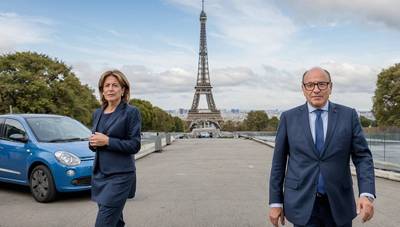Minister: France will not abandon the climate goals of the World Bank
Eleonore Caoit, France's new development minister, said that France would continue to press the World Bank for its climate finance agenda in spite of the pressure from the Trump administration to abandon it.
Caroit, speaking to reporters at the World Bank's and International Monetary Fund's annual meetings in Washington, said that efforts to combat climate change will also be a major focus of France’s presidency of the Group of Seven Industrial Democracies (G7ID) in 2026. Caroit was appointed as junior minister of Francophonie and international partnerships, and French people overseas in the newly reappointed cabinet of French Prime Minister Sebastien lecornu on Sunday. She then rushed to Washington.
Caroit told reporters that she had discussed with Treasury Sec. Scott Bessent, the U.S. request for the World Bank not to follow the goal set by the Biden Administration to increase climate-related lending to 45% from 35%.
Caroit added that France was committed to keeping targets in line with the Paris Climate Accords, which Trump had abandoned for the second time this January.
"For us, the climate is of utmost concern because we are aligned with bank's goal of job creation and development, but they must be jobs in a world that can sustain life. "If not, then why think about jobs?" she asked.
Possible Areas of Agreement
Ajay Banaga, the World Bank's president, persuaded its shareholders in 2023 to adopt a vision statement that used similar language. "A world without poverty on a planet livable" was adopted to include its new climate finance push and expanded bank balance sheet.
Bessent has criticized the statement, calling it "vapid and buzzword-centric advertising." He called on Friday for the World Bank, as well as gas, oil, and nuclear energy, to finance coal projects. Bessent, in a letter to the IMF steering group, said that the target of 45% "co-benefits from climate change" "skews project priorities away from countries and distorts the goal of increasing energy access."
Caroit stated, "I believe that it is important to have frank discussions and identify where there are disagreements."
She said that Bessent was a good example of a person who was willing to explore renewable energy when it was economically feasible.
Caroit stated that the U.S., France and other countries with nuclear reactors, which generate more than 70% the electricity in their country, are all on the same page about the status of nuclear energy as a source of sustainable energy.
He also stated that France and the U.S. could agree on climate adaptation projects and resilience development that would prevent wildfires and floods that can affect economic growth and ultimately lead to energy shifts. These projects are part of the World Bank's climate finance goals.
Caroit: "We call this climate, but they can call it whatever they like."
She said that the U.S., France and other countries disagreed on many principles including climate, but both will strive to get more out of development, particularly in a time when fiscal budgets are tight, especially for France.
Caroit said, "We all agree that we need to rethink our entire architectural and financial structures if want to preserve and enhance the most important development. (Reporting and editing by David Lawder)
(source: Reuters)



